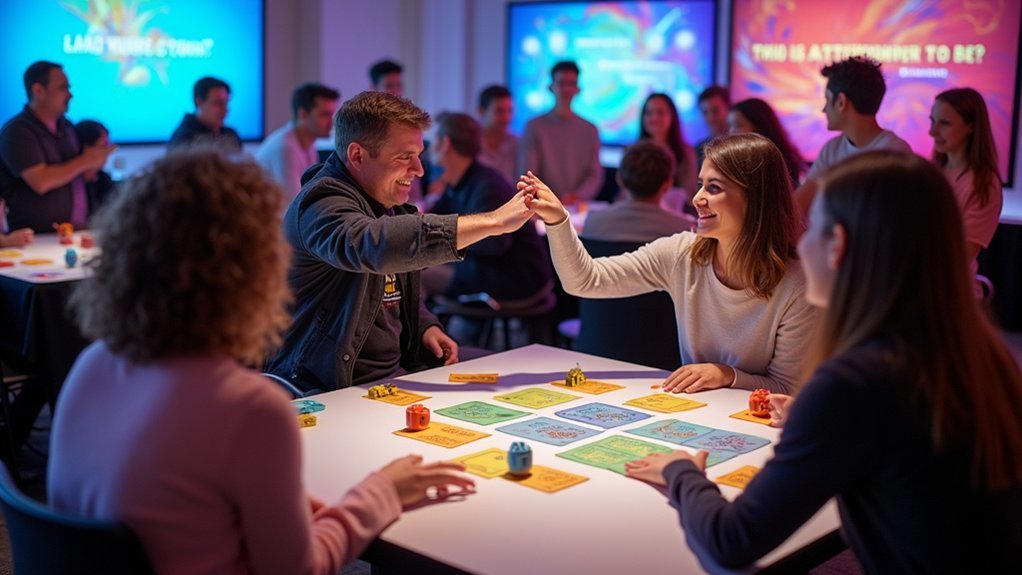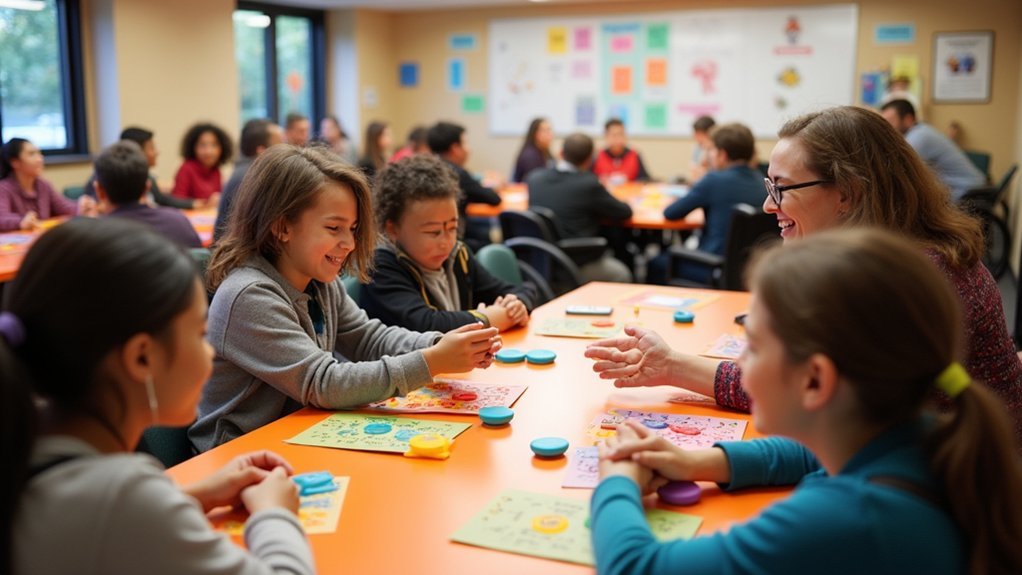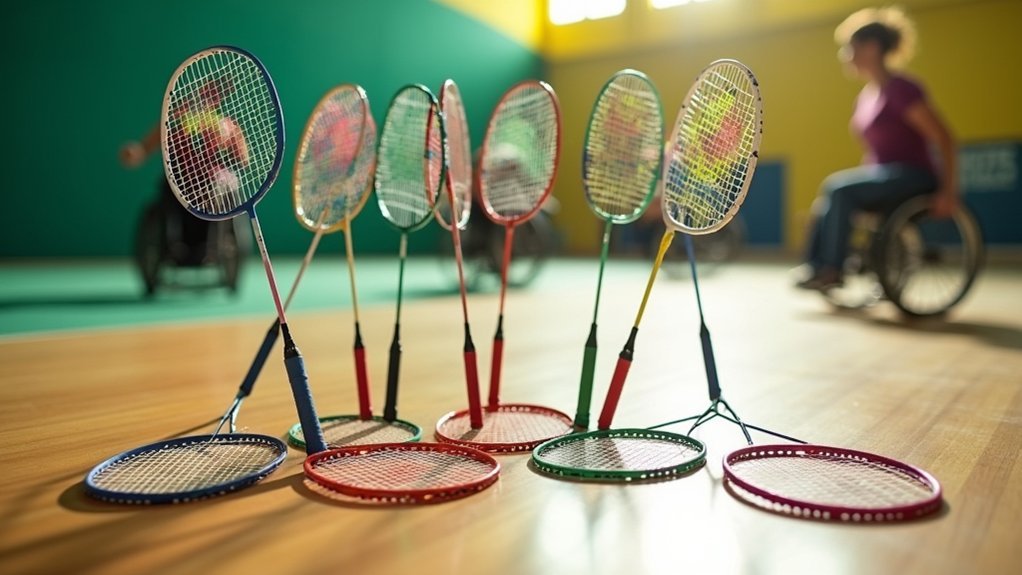Inclusive trivia games accommodate all physical abilities through adaptable technology and thoughtful design. You’ll find options like customizable buzzers requiring minimal pressure, voice-activated systems, and digital interfaces with adjustable text sizes. Modern games feature multi-sensory feedback, flexible time limits, and diverse question formats to engage participants regardless of mobility challenges. Creating diverse teams during gameplay breaks down barriers while boosting cognitive benefits for everyone involved. The joy of inclusive trivia extends far beyond entertainment—it builds genuine community connections and unexpected learning opportunities.
The Evolution of Accessible Trivia Game Design

While trivia games have entertained players for generations, their evolution toward true accessibility represents a remarkable journey of technological innovation and shifting design philosophies.
You can trace accessibility’s roots to the 1950s when “Bertie The Brain” introduced adjustable difficulty levels. By the 1980s, Nintendo’s Hands Free controller pioneered hardware solutions for players with mobility challenges.
The 2000s brought transformative changes with PlayStation 3’s customizable button mapping and the iPhone’s democratization of game development. Educational gaming platforms began incorporating interactive quizzes and trivia challenges to enhance accessibility and learning engagement.
Today’s trivia games incorporate multi-sensory feedback, voice recognition, and adaptive difficulty—features unimaginable decades ago.
The industry has shifted from one-size-fits-all to user-centered design, with indie developers often leading accessibility innovation. This evolution reflects gaming’s gradual recognition that accessibility isn’t an afterthought but a fundamental design principle.
Adaptive Equipment for Inclusive Trivia Participation
You’ll find a range of adaptive equipment to make trivia games accessible for everyone, including customizable buzzers that can be operated with minimal pressure.
Large-print question cards eliminate barriers for participants with visual impairments, while voice-activated response systems allow those with limited mobility to join in the fun.
These tools transform traditional trivia formats into inclusive experiences where everyone can showcase their knowledge regardless of physical abilities. For players with sight challenges, O&M Trivia games available on Amazon Alexa and Google Assistant offer interactive gameplay without requiring visual interaction.
Customizable Buzzers
Because traditional trivia games often exclude participants with disabilities, customizable buzzers serve as a crucial bridge to inclusive participation.
These adaptive systems offer multiple sounds, colors, and control options to accommodate diverse sensory needs.
You’ll find solutions ranging from wireless TM102 systems to smartphone apps that eliminate physical barriers.
Online platforms like Kahoot and BuzzIn enable virtual engagement, while audience response keyboards accommodate remote participants and those with mobility challenges.
Look for buzzers with intuitive controls for participants with limited dexterity.
The variety of sounds—from horn honks to doorbell chimes—supports players with different auditory preferences.
Many systems also feature color-coding to assist visually impaired participants.
These customizable options transform trivia from an exclusive activity into an engaging experience where everyone can participate regardless of physical ability.
Implementing adaptive buzzers in ERG events helps in fostering awareness of different accessibility needs while creating an inclusive environment for all team members.
Large-Print Question Cards
Large-print question cards represent a fundamental component in creating truly accessible trivia experiences. When designing these cards, use at least 18-point sans-serif fonts like Arial on larger 5×7-inch formats with high contrast colors to maximize readability for visually impaired participants. These adaptable formats align perfectly with the existing trivia collection that includes 800 printable cards across various themes.
| Feature | Benefit | Implementation |
|---|---|---|
| Font Size (18pt+) | Improves readability | Use in all printed materials |
| Color Contrast | Enhances visibility | Black text on white background |
| Card Size (5×7″) | Easier handling | Sturdy cardstock with rounded edges |
You’ll find these cards particularly valuable in educational settings, community events, and family gatherings. By incorporating visual cues alongside questions, you’re supporting players with learning disabilities. Digital versions can further enhance accessibility by allowing font adjustments and incorporating text-to-speech functionality for participants with varying needs.
Voice-Activated Response Systems
Voice-activated response systems represent a transformative advancement in inclusive trivia participation, especially for players with mobility or dexterity challenges.
You’ll find these systems enable independent gameplay without physical controls, supporting up to 36 miles of communication range without monthly fees.
When implementing voice-activated trivia, you’re providing multiple benefits: participants can respond to questions hands-free, receive tactile feedback through vibrating alerts, and maintain privacy using integrated headsets in noisy environments.
AI-powered voice recognition continuously improves accuracy while supporting multiple languages and dialects.
These systems particularly benefit those with limited hand dexterity or fatigue issues, replacing traditional buttons and keyboards with natural speech commands. Many of these systems feature voice-controlled dialing capabilities similar to those found in specialized telephones.
With voice biometrics enhancing security and personalization, you’re creating a more confident, autonomous experience for all players.
Cognitive Benefits of Trivia Games for Diverse Abilities
You’ll find that trivia games sharpen mental agility regardless of physical ability, offering accessible cognitive exercise for everyone.
Your memory will strengthen through regular participation as trivia activates multiple brain regions, supporting neural connections that enhance recall and processing speed.
When you engage with diverse trivia challenges, you’re building problem-solving skills that transfer to daily life, creating cognitive resilience that benefits your overall brain health. Research suggests participating in trivia releases dopamine bursts when answering correctly, contributing to improved mental well-being without risks.
Mental Agility for All
While often enjoyed simply for entertainment, trivia games offer profound cognitive benefits that extend across diverse abilities and age groups. You’ll find your brain engages multiple regions responsible for critical thinking and reasoning when tackling trivia challenges. These games create an accessible cognitive workout that adapts to various ability levels. Regular participation in trivia competitions has shown to enhance problem-solving skills that players can apply to overcome challenges in their everyday lives.
| Cognitive Benefit | How Trivia Helps | Who Benefits |
|---|---|---|
| Memory Retention | Retrieval practice under time constraints | All age groups |
| Creative Thinking | Making novel connections between facts | Problem-solvers |
| Stress Reduction | Social engagement lowers cortisol levels | Those with anxiety |
| Cognitive Flexibility | Exposure to diverse topics | Varied cognitive abilities |
The beauty of trivia lies in its adaptability—questions can incorporate verbal, visual, or tactile elements to accommodate different processing needs, ensuring everyone can participate and benefit.
Memory Enhancement Benefits
Trivia games serve as powerful cognitive exercise machines, strengthening memory pathways across diverse cognitive abilities. When you engage with trivia, you’re creating cue-target pairs that enhance memory performance regardless of your age or physical capability.
Regular participation yields cumulative benefits, particularly for older adults who experience improved recall over time. You’ll notice the brain’s reward network activating during gameplay, making learning more enjoyable and memorable. This neuroplasticity enhancement translates to increased creativity and cognitive flexibility in daily life. Research has shown that intellectually stimulating activities like trivia games contribute to higher cognitive function in older adults.
What makes trivia particularly inclusive is how it accommodates mixed abilities through technology integration and team-based formats. You can contribute based on your unique strengths while still experiencing the memory-boosting benefits.
The social aspect creates a motivational environment where knowledge is shared and celebrated across physical ability differences.
Problem-Solving Across Abilities
When players engage in problem-solving through trivia games, they’re exercising a unique form of cognitive flexibility that transcends physical limitations. This flexibility stimulates neuroplasticity, allowing your brain to reorganize itself and improve cognitive function regardless of physical ability.
Trivia’s power lies in promoting asymmetric thinking—you’ll find yourself exploring unconventional solutions that boost creativity and innovation. As you tackle diverse questions, you’re building adaptability in learning approaches and enhancing critical thinking skills.
The social engagement aspect of trivia creates additional cognitive benefits. By participating in team-based formats, you’ll develop communication skills while collaborating with people of varying abilities. Trivia players often experience improved mood and wellbeing as neurochemicals are released during these engaging mental activities.
This inclusive environment fosters concept formation as you connect ideas across different knowledge domains, ultimately strengthening your problem-solving capabilities in real-world situations.
Breaking Barriers: Trivia Games That Challenge Stereotypes
As society continues to evolve toward greater inclusion, trivia games have emerged as powerful tools for challenging long-held stereotypes about disabilities. You’ll find these games particularly effective as they incorporate questions that address common misconceptions while highlighting achievements of notable figures with disabilities.
When you design inclusive trivia, include questions about disability rights milestones and legislation that promote awareness of historical context. Add multimedia elements to accommodate diverse abilities and consider role-reversal activities that simulate experiences of people with different abilities. Consider hosting interactive sessions that focus specifically on disability history and integrate accessibility rights questions to enhance participants’ understanding of important protections.
You’re not just entertaining participants—you’re building community and fostering understanding. By framing disability as an integral part of human diversity, your trivia games can spark meaningful conversations and promote respectful language while bringing people together regardless of physical ability.
Virtual and Physical Accessibility Features in Modern Trivia Formats

Modern game designers have transformed the landscape of trivia platforms with thoughtful virtual and physical accessibility features. You’ll find digital interfaces that accommodate adjustable text sizes and difficulty levels, perfect for players with varying visual and cognitive abilities.
Virtual trivia games now integrate with meeting software, allowing remote participation for those with mobility challenges. Meanwhile, physical games incorporate large-print cards, user-friendly boards, and adaptive tools for different physical abilities. Teach Access offers trivia slide decks that can be viewed independently or with groups, making participation flexible for people of all abilities.
Games like O&M Trivia offer customizable settings for up to four players, complete with automatic scorekeeping to reduce manual tracking needs. Many platforms provide audio integration options and support multiple languages, while cloud-based solutions guarantee you can play from anywhere.
These innovations make trivia more inclusive while preserving the educational and social benefits these games naturally provide.
Building Community Through Inclusive Trivia Events
Beyond mere entertainment, inclusive trivia events have emerged as powerful community-building tools that foster connection across diverse populations.
When you organize trivia with strategically diverse teams, you’ll break down departmental barriers and improve communication by over 50%.
You’ll notice participants from different backgrounds mingling naturally, as trivia focuses on shared knowledge rather than personal characteristics. This inclusivity creates a sense of belonging that increases employee retention by 54% in workplace settings.
Consider hosting charitable trivia nights to combine socialization with social impact. These events serve as effective icebreakers while boosting innovation by 15% through frequent collaboration. Employees report feeling more valued and appreciated when participating in these inclusive activities, creating a positive work environment that extends beyond the event itself.
Women with close work friends formed during activities like trivia are 63% more likely to be engaged employees, demonstrating trivia’s value beyond the questions asked.
Educational Impact: Learning Through Accessible Trivia Challenges

The educational benefits of inclusive trivia extend far beyond the social impacts we’ve explored. Research shows that participants in trivia-based review activities score markedly higher on assessments—often a full letter grade better than those who don’t participate.
Inclusive trivia doesn’t just build community—it measurably improves academic performance, boosting grades and knowledge retention.
You’ll find that accessible trivia games enhance learning for everyone by reinforcing course material through engaging competition. Digital platforms amplify these benefits by boosting motivation and allowing customizable pacing for different physical abilities. Implementing game elements like points and badges can significantly increase student motivation in statistics and other challenging subjects.
When you incorporate trivia into educational settings, you’re not just making learning fun—you’re facilitating cognitive development, strategic thinking, and problem-solving skills across diverse ability groups.
The combination of competition and collaboration helps vulnerable learners overcome pressure while building interest in content, making trivia an invaluable educational tool for inclusive classrooms.
Designing Your Own Ability-Inclusive Trivia Experience
When designing your own ability-inclusive trivia game, focus on flexibility and adaptation as your guiding principles. Incorporate adjustable time limits and difficulty levels that players can modify based on their abilities.
Offer multiple interaction methods—voice commands, touch interfaces, or keyboard shortcuts—to accommodate diverse physical needs.
Create question sets that represent various cultural perspectives and knowledge bases. You’ll want to guarantee your physical space has flexible seating arrangements and is wheelchair accessible, or consider virtual game rooms for remote participation.
Implement technological aids like screen readers and text-to-speech software. Following game accessibility guidelines ensures your trivia game remains enjoyable for a wide range of people regardless of ability.
Don’t forget to gather feedback from players with diverse abilities. Their input will help you refine your game, making it truly inclusive and enjoyable for everyone involved.
Frequently Asked Questions
How Do I Fund Inclusive Trivia Events on a Limited Budget?
You can fund trivia events by charging small entry fees, seeking local business sponsorships, hosting virtual events to reduce costs, organizing raffles with donated items, and utilizing volunteer staff to minimize expenses.
Can Trivia Competitions Qualify for Disability Accommodation Tax Credits?
Yes, your trivia competitions may qualify for tax credits if you’re making accessibility accommodations. You’ll need to document expenses for reasonable modifications that help participants with disabilities. Use Form 8826 to claim these credits.
What Certifications Exist for Inclusive Trivia Game Facilitators?
You’ll find several relevant certifications: INIFAC facilitation accreditation, Cultural Intelligence certification, ATD’s Training & Facilitation Certificate, and Voltage Control’s facilitation program. These enhance your ability to create inclusive trivia experiences for diverse participants.
How Do Cultural Differences Impact Disability-Themed Trivia Questions?
Cultural differences impact disability-themed trivia questions through varying terminology preferences, differing disability models, and distinct cultural beliefs. You’ll need to adapt language, representation, and content to respect diverse perspectives and avoid cultural misunderstandings.
What Insurance Considerations Apply When Hosting Ability-Inclusive Trivia Competitions?
You’ll need event liability insurance covering accessibility claims, venue-specific coverage, and workers’ compensation. Don’t forget to secure waivers from participants and guarantee your policies explicitly cover disability accommodations and potential medical emergencies.
In Summary
You’ve now got everything you need to make trivia truly inclusive. By embracing accessible design, adaptive equipment, and inclusive formats, you’re not just hosting a game—you’re building community. Remember, inclusive trivia isn’t about lowering the bar but widening the circle. When everyone can participate, we all win. Take what you’ve learned and create trivia experiences that celebrate knowledge while honoring diverse abilities and perspectives.





Leave a Reply